A Report on Personal and Professional Development and Activities
VerifiedAdded on 2023/06/11
|9
|2129
|375
Report
AI Summary
This report delves into the essential aspects of personal and professional development in the modern business landscape. It highlights the processes and activities necessary for implementing a robust development plan, emphasizing the importance of setting timelines, employing effective learning strategies, and leveraging skills, knowledge, and resources. The report further discusses the significance of documenting developmental activities for change management and continuous improvement, alongside monitoring and evaluation to identify gaps and ensure alignment with objectives. It also underscores the role of self-motivation and learning from others in achieving personal and professional goals, while stressing the need for regular updates to the development plan based on evaluation and feedback, including adjustments to training methodologies and approaches. The report concludes that a well-executed and continuously refined development plan is crucial for both individual and organizational success.
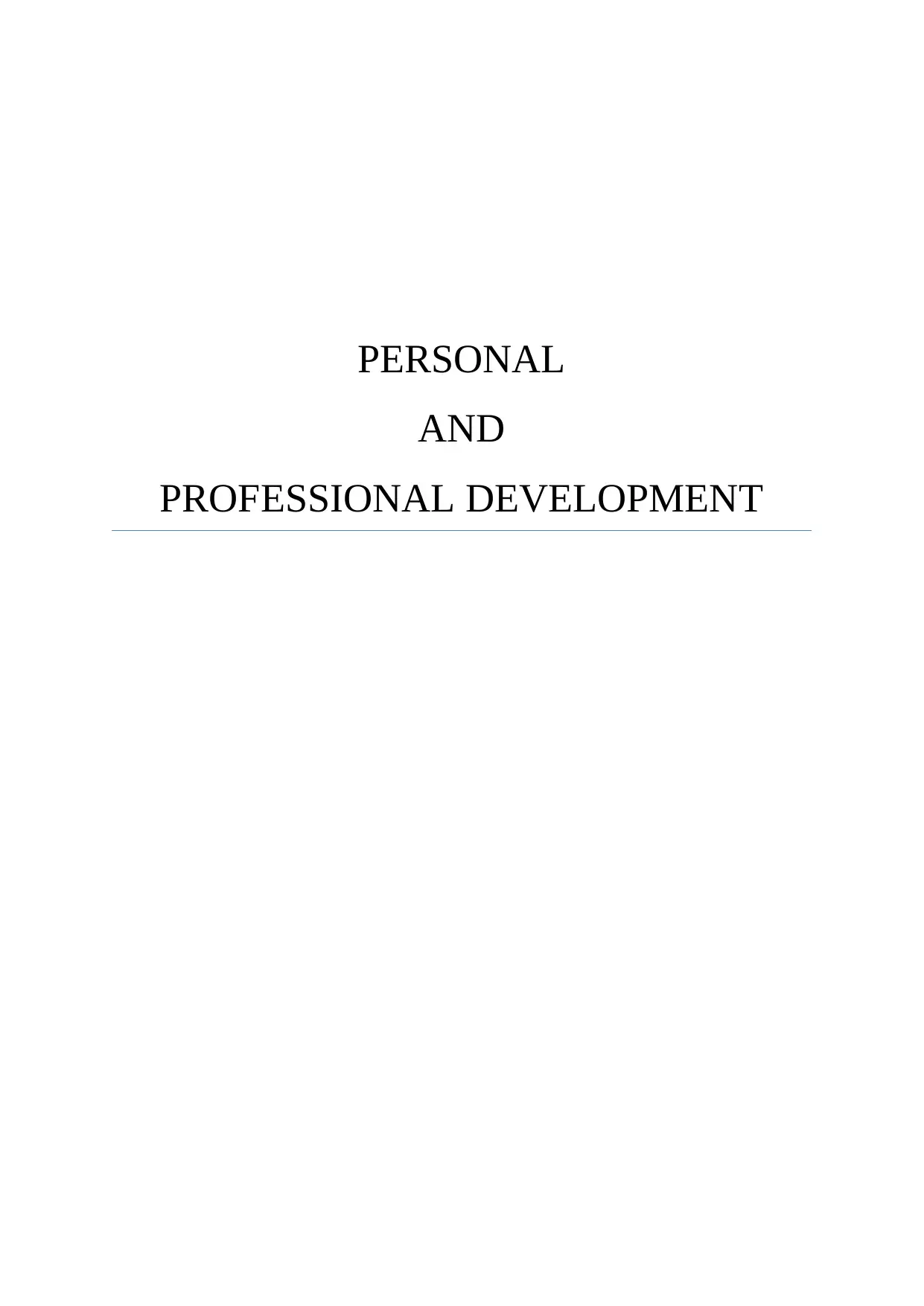
PERSONAL
AND
PROFESSIONAL DEVELOPMENT
AND
PROFESSIONAL DEVELOPMENT
Paraphrase This Document
Need a fresh take? Get an instant paraphrase of this document with our AI Paraphraser
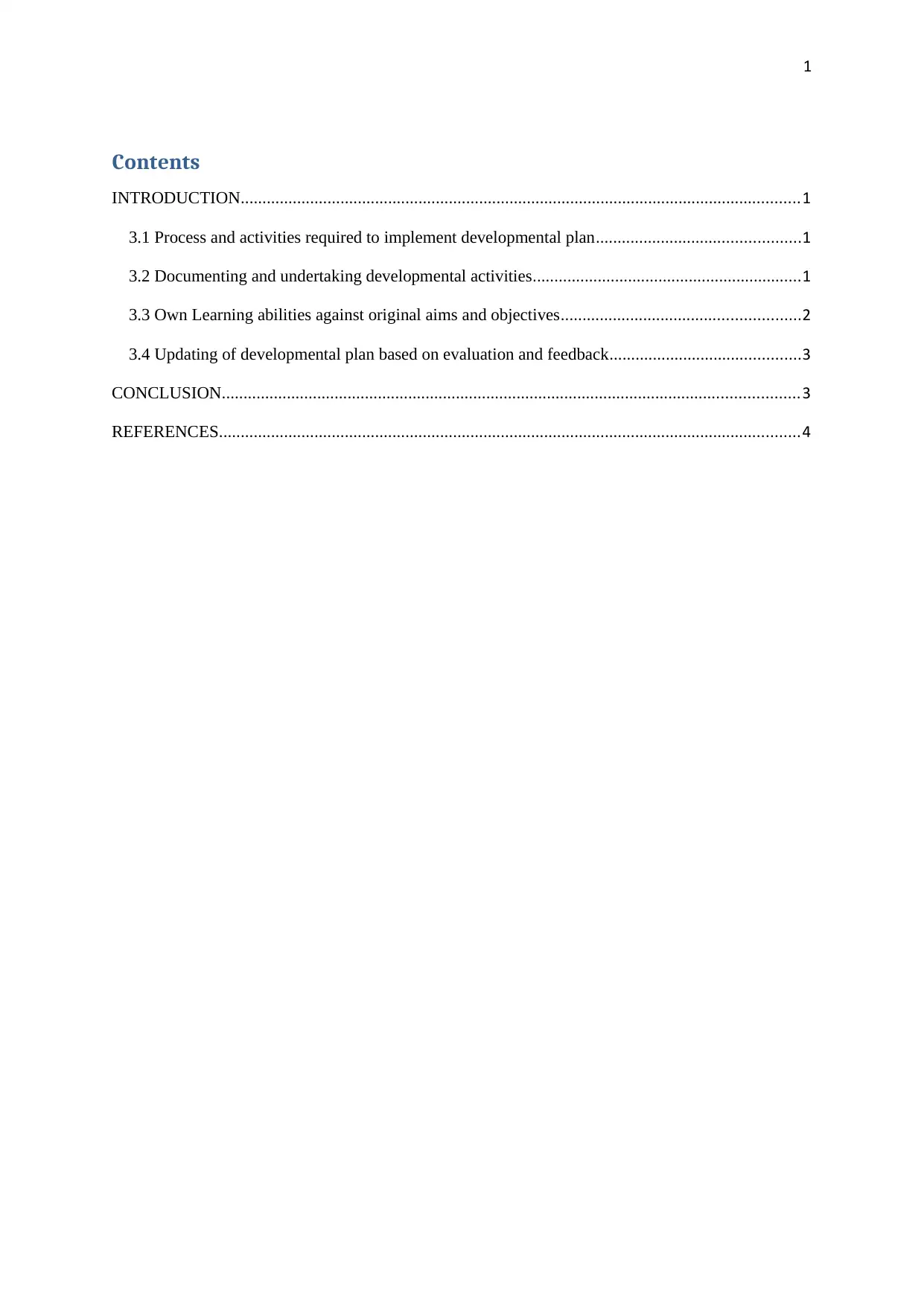
1
Contents
INTRODUCTION.................................................................................................................................1
3.1 Process and activities required to implement developmental plan...............................................1
3.2 Documenting and undertaking developmental activities..............................................................1
3.3 Own Learning abilities against original aims and objectives.......................................................2
3.4 Updating of developmental plan based on evaluation and feedback............................................3
CONCLUSION.....................................................................................................................................3
REFERENCES......................................................................................................................................4
Contents
INTRODUCTION.................................................................................................................................1
3.1 Process and activities required to implement developmental plan...............................................1
3.2 Documenting and undertaking developmental activities..............................................................1
3.3 Own Learning abilities against original aims and objectives.......................................................2
3.4 Updating of developmental plan based on evaluation and feedback............................................3
CONCLUSION.....................................................................................................................................3
REFERENCES......................................................................................................................................4
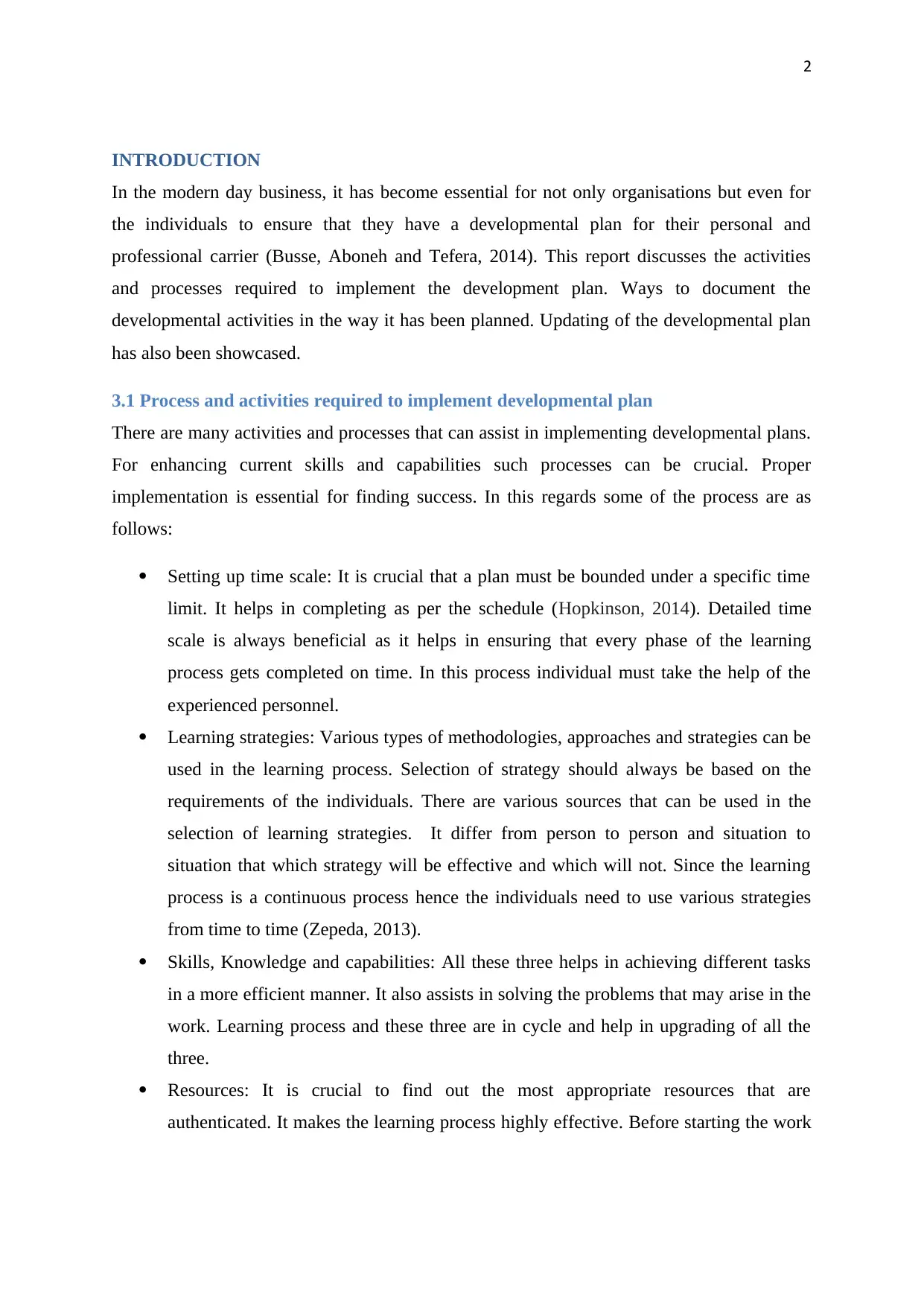
2
INTRODUCTION
In the modern day business, it has become essential for not only organisations but even for
the individuals to ensure that they have a developmental plan for their personal and
professional carrier (Busse, Aboneh and Tefera, 2014). This report discusses the activities
and processes required to implement the development plan. Ways to document the
developmental activities in the way it has been planned. Updating of the developmental plan
has also been showcased.
3.1 Process and activities required to implement developmental plan
There are many activities and processes that can assist in implementing developmental plans.
For enhancing current skills and capabilities such processes can be crucial. Proper
implementation is essential for finding success. In this regards some of the process are as
follows:
Setting up time scale: It is crucial that a plan must be bounded under a specific time
limit. It helps in completing as per the schedule (Hopkinson, 2014). Detailed time
scale is always beneficial as it helps in ensuring that every phase of the learning
process gets completed on time. In this process individual must take the help of the
experienced personnel.
Learning strategies: Various types of methodologies, approaches and strategies can be
used in the learning process. Selection of strategy should always be based on the
requirements of the individuals. There are various sources that can be used in the
selection of learning strategies. It differ from person to person and situation to
situation that which strategy will be effective and which will not. Since the learning
process is a continuous process hence the individuals need to use various strategies
from time to time (Zepeda, 2013).
Skills, Knowledge and capabilities: All these three helps in achieving different tasks
in a more efficient manner. It also assists in solving the problems that may arise in the
work. Learning process and these three are in cycle and help in upgrading of all the
three.
Resources: It is crucial to find out the most appropriate resources that are
authenticated. It makes the learning process highly effective. Before starting the work
INTRODUCTION
In the modern day business, it has become essential for not only organisations but even for
the individuals to ensure that they have a developmental plan for their personal and
professional carrier (Busse, Aboneh and Tefera, 2014). This report discusses the activities
and processes required to implement the development plan. Ways to document the
developmental activities in the way it has been planned. Updating of the developmental plan
has also been showcased.
3.1 Process and activities required to implement developmental plan
There are many activities and processes that can assist in implementing developmental plans.
For enhancing current skills and capabilities such processes can be crucial. Proper
implementation is essential for finding success. In this regards some of the process are as
follows:
Setting up time scale: It is crucial that a plan must be bounded under a specific time
limit. It helps in completing as per the schedule (Hopkinson, 2014). Detailed time
scale is always beneficial as it helps in ensuring that every phase of the learning
process gets completed on time. In this process individual must take the help of the
experienced personnel.
Learning strategies: Various types of methodologies, approaches and strategies can be
used in the learning process. Selection of strategy should always be based on the
requirements of the individuals. There are various sources that can be used in the
selection of learning strategies. It differ from person to person and situation to
situation that which strategy will be effective and which will not. Since the learning
process is a continuous process hence the individuals need to use various strategies
from time to time (Zepeda, 2013).
Skills, Knowledge and capabilities: All these three helps in achieving different tasks
in a more efficient manner. It also assists in solving the problems that may arise in the
work. Learning process and these three are in cycle and help in upgrading of all the
three.
Resources: It is crucial to find out the most appropriate resources that are
authenticated. It makes the learning process highly effective. Before starting the work
⊘ This is a preview!⊘
Do you want full access?
Subscribe today to unlock all pages.

Trusted by 1+ million students worldwide
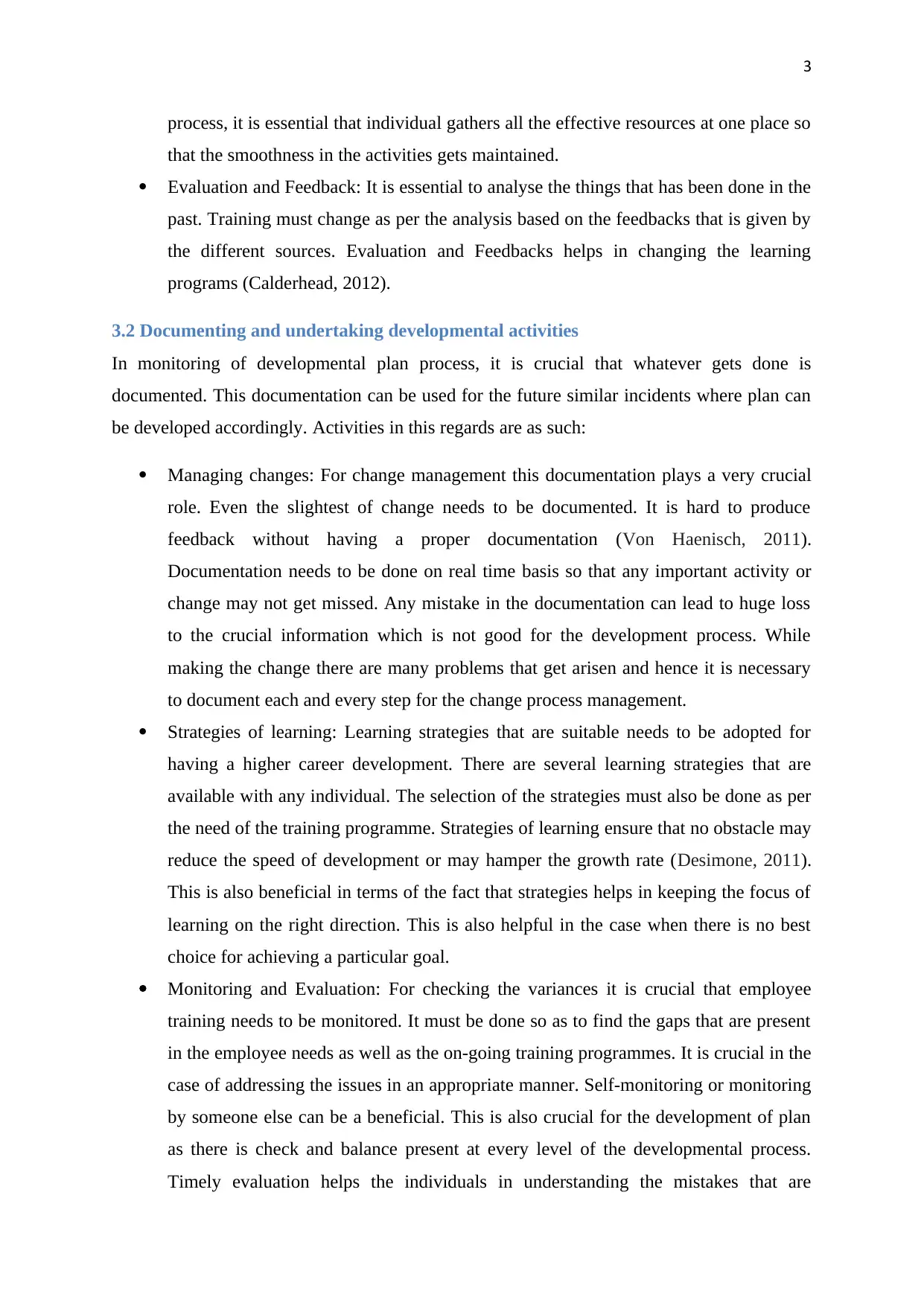
3
process, it is essential that individual gathers all the effective resources at one place so
that the smoothness in the activities gets maintained.
Evaluation and Feedback: It is essential to analyse the things that has been done in the
past. Training must change as per the analysis based on the feedbacks that is given by
the different sources. Evaluation and Feedbacks helps in changing the learning
programs (Calderhead, 2012).
3.2 Documenting and undertaking developmental activities
In monitoring of developmental plan process, it is crucial that whatever gets done is
documented. This documentation can be used for the future similar incidents where plan can
be developed accordingly. Activities in this regards are as such:
Managing changes: For change management this documentation plays a very crucial
role. Even the slightest of change needs to be documented. It is hard to produce
feedback without having a proper documentation (Von Haenisch, 2011).
Documentation needs to be done on real time basis so that any important activity or
change may not get missed. Any mistake in the documentation can lead to huge loss
to the crucial information which is not good for the development process. While
making the change there are many problems that get arisen and hence it is necessary
to document each and every step for the change process management.
Strategies of learning: Learning strategies that are suitable needs to be adopted for
having a higher career development. There are several learning strategies that are
available with any individual. The selection of the strategies must also be done as per
the need of the training programme. Strategies of learning ensure that no obstacle may
reduce the speed of development or may hamper the growth rate (Desimone, 2011).
This is also beneficial in terms of the fact that strategies helps in keeping the focus of
learning on the right direction. This is also helpful in the case when there is no best
choice for achieving a particular goal.
Monitoring and Evaluation: For checking the variances it is crucial that employee
training needs to be monitored. It must be done so as to find the gaps that are present
in the employee needs as well as the on-going training programmes. It is crucial in the
case of addressing the issues in an appropriate manner. Self-monitoring or monitoring
by someone else can be a beneficial. This is also crucial for the development of plan
as there is check and balance present at every level of the developmental process.
Timely evaluation helps the individuals in understanding the mistakes that are
process, it is essential that individual gathers all the effective resources at one place so
that the smoothness in the activities gets maintained.
Evaluation and Feedback: It is essential to analyse the things that has been done in the
past. Training must change as per the analysis based on the feedbacks that is given by
the different sources. Evaluation and Feedbacks helps in changing the learning
programs (Calderhead, 2012).
3.2 Documenting and undertaking developmental activities
In monitoring of developmental plan process, it is crucial that whatever gets done is
documented. This documentation can be used for the future similar incidents where plan can
be developed accordingly. Activities in this regards are as such:
Managing changes: For change management this documentation plays a very crucial
role. Even the slightest of change needs to be documented. It is hard to produce
feedback without having a proper documentation (Von Haenisch, 2011).
Documentation needs to be done on real time basis so that any important activity or
change may not get missed. Any mistake in the documentation can lead to huge loss
to the crucial information which is not good for the development process. While
making the change there are many problems that get arisen and hence it is necessary
to document each and every step for the change process management.
Strategies of learning: Learning strategies that are suitable needs to be adopted for
having a higher career development. There are several learning strategies that are
available with any individual. The selection of the strategies must also be done as per
the need of the training programme. Strategies of learning ensure that no obstacle may
reduce the speed of development or may hamper the growth rate (Desimone, 2011).
This is also beneficial in terms of the fact that strategies helps in keeping the focus of
learning on the right direction. This is also helpful in the case when there is no best
choice for achieving a particular goal.
Monitoring and Evaluation: For checking the variances it is crucial that employee
training needs to be monitored. It must be done so as to find the gaps that are present
in the employee needs as well as the on-going training programmes. It is crucial in the
case of addressing the issues in an appropriate manner. Self-monitoring or monitoring
by someone else can be a beneficial. This is also crucial for the development of plan
as there is check and balance present at every level of the developmental process.
Timely evaluation helps the individuals in understanding the mistakes that are
Paraphrase This Document
Need a fresh take? Get an instant paraphrase of this document with our AI Paraphraser
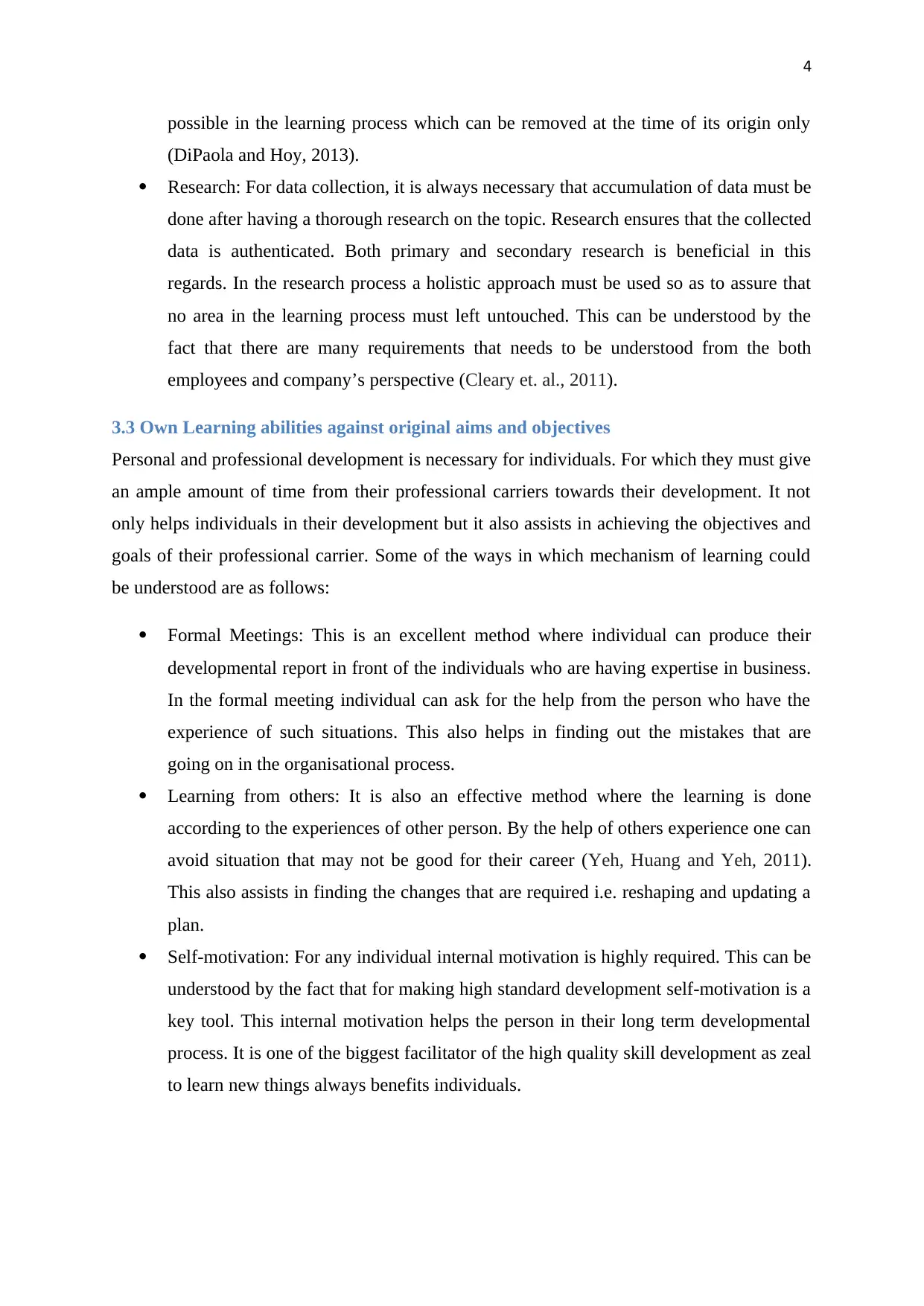
4
possible in the learning process which can be removed at the time of its origin only
(DiPaola and Hoy, 2013).
Research: For data collection, it is always necessary that accumulation of data must be
done after having a thorough research on the topic. Research ensures that the collected
data is authenticated. Both primary and secondary research is beneficial in this
regards. In the research process a holistic approach must be used so as to assure that
no area in the learning process must left untouched. This can be understood by the
fact that there are many requirements that needs to be understood from the both
employees and company’s perspective (Cleary et. al., 2011).
3.3 Own Learning abilities against original aims and objectives
Personal and professional development is necessary for individuals. For which they must give
an ample amount of time from their professional carriers towards their development. It not
only helps individuals in their development but it also assists in achieving the objectives and
goals of their professional carrier. Some of the ways in which mechanism of learning could
be understood are as follows:
Formal Meetings: This is an excellent method where individual can produce their
developmental report in front of the individuals who are having expertise in business.
In the formal meeting individual can ask for the help from the person who have the
experience of such situations. This also helps in finding out the mistakes that are
going on in the organisational process.
Learning from others: It is also an effective method where the learning is done
according to the experiences of other person. By the help of others experience one can
avoid situation that may not be good for their career (Yeh, Huang and Yeh, 2011).
This also assists in finding the changes that are required i.e. reshaping and updating a
plan.
Self-motivation: For any individual internal motivation is highly required. This can be
understood by the fact that for making high standard development self-motivation is a
key tool. This internal motivation helps the person in their long term developmental
process. It is one of the biggest facilitator of the high quality skill development as zeal
to learn new things always benefits individuals.
possible in the learning process which can be removed at the time of its origin only
(DiPaola and Hoy, 2013).
Research: For data collection, it is always necessary that accumulation of data must be
done after having a thorough research on the topic. Research ensures that the collected
data is authenticated. Both primary and secondary research is beneficial in this
regards. In the research process a holistic approach must be used so as to assure that
no area in the learning process must left untouched. This can be understood by the
fact that there are many requirements that needs to be understood from the both
employees and company’s perspective (Cleary et. al., 2011).
3.3 Own Learning abilities against original aims and objectives
Personal and professional development is necessary for individuals. For which they must give
an ample amount of time from their professional carriers towards their development. It not
only helps individuals in their development but it also assists in achieving the objectives and
goals of their professional carrier. Some of the ways in which mechanism of learning could
be understood are as follows:
Formal Meetings: This is an excellent method where individual can produce their
developmental report in front of the individuals who are having expertise in business.
In the formal meeting individual can ask for the help from the person who have the
experience of such situations. This also helps in finding out the mistakes that are
going on in the organisational process.
Learning from others: It is also an effective method where the learning is done
according to the experiences of other person. By the help of others experience one can
avoid situation that may not be good for their career (Yeh, Huang and Yeh, 2011).
This also assists in finding the changes that are required i.e. reshaping and updating a
plan.
Self-motivation: For any individual internal motivation is highly required. This can be
understood by the fact that for making high standard development self-motivation is a
key tool. This internal motivation helps the person in their long term developmental
process. It is one of the biggest facilitator of the high quality skill development as zeal
to learn new things always benefits individuals.
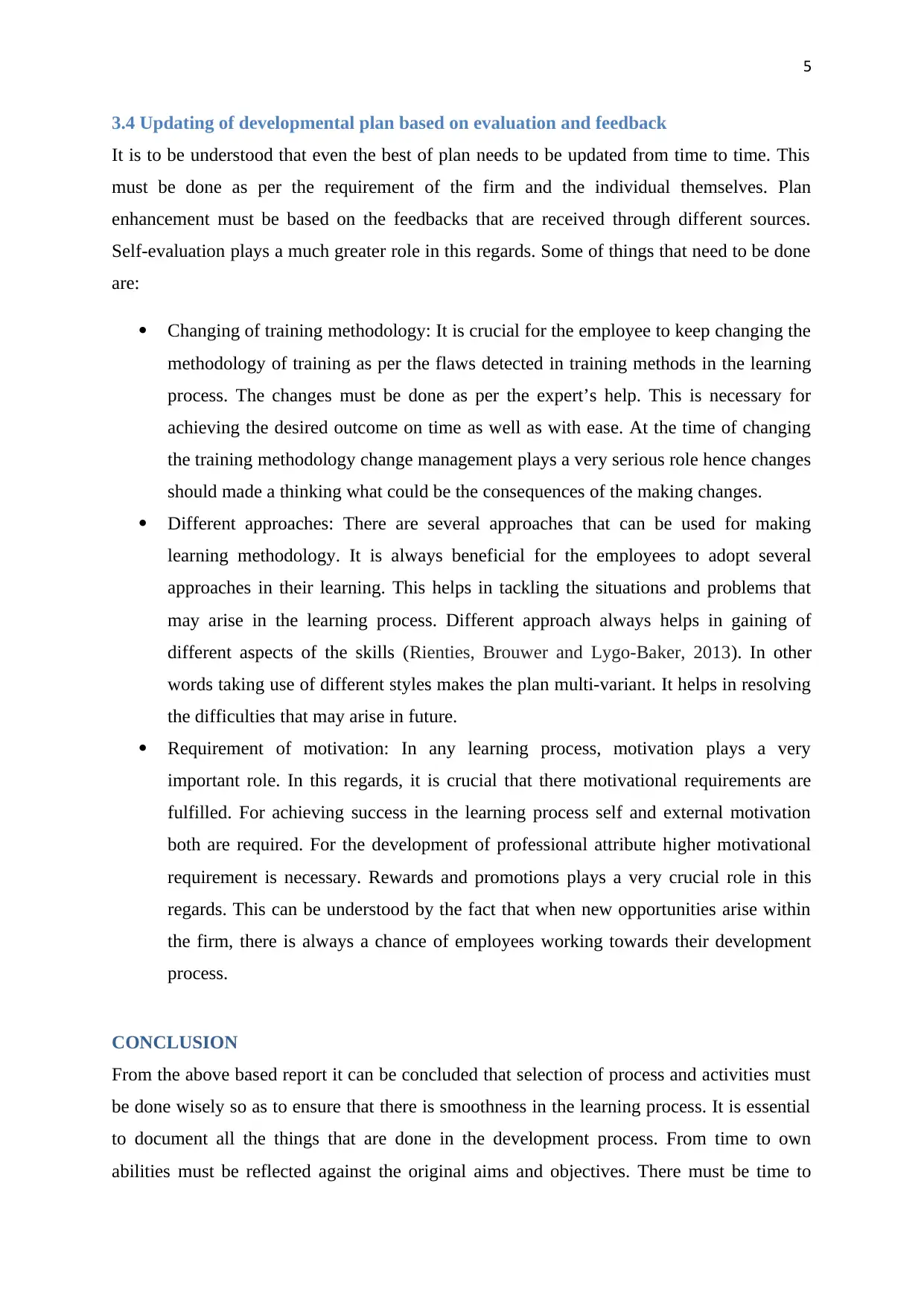
5
3.4 Updating of developmental plan based on evaluation and feedback
It is to be understood that even the best of plan needs to be updated from time to time. This
must be done as per the requirement of the firm and the individual themselves. Plan
enhancement must be based on the feedbacks that are received through different sources.
Self-evaluation plays a much greater role in this regards. Some of things that need to be done
are:
Changing of training methodology: It is crucial for the employee to keep changing the
methodology of training as per the flaws detected in training methods in the learning
process. The changes must be done as per the expert’s help. This is necessary for
achieving the desired outcome on time as well as with ease. At the time of changing
the training methodology change management plays a very serious role hence changes
should made a thinking what could be the consequences of the making changes.
Different approaches: There are several approaches that can be used for making
learning methodology. It is always beneficial for the employees to adopt several
approaches in their learning. This helps in tackling the situations and problems that
may arise in the learning process. Different approach always helps in gaining of
different aspects of the skills (Rienties, Brouwer and Lygo-Baker, 2013). In other
words taking use of different styles makes the plan multi-variant. It helps in resolving
the difficulties that may arise in future.
Requirement of motivation: In any learning process, motivation plays a very
important role. In this regards, it is crucial that there motivational requirements are
fulfilled. For achieving success in the learning process self and external motivation
both are required. For the development of professional attribute higher motivational
requirement is necessary. Rewards and promotions plays a very crucial role in this
regards. This can be understood by the fact that when new opportunities arise within
the firm, there is always a chance of employees working towards their development
process.
CONCLUSION
From the above based report it can be concluded that selection of process and activities must
be done wisely so as to ensure that there is smoothness in the learning process. It is essential
to document all the things that are done in the development process. From time to own
abilities must be reflected against the original aims and objectives. There must be time to
3.4 Updating of developmental plan based on evaluation and feedback
It is to be understood that even the best of plan needs to be updated from time to time. This
must be done as per the requirement of the firm and the individual themselves. Plan
enhancement must be based on the feedbacks that are received through different sources.
Self-evaluation plays a much greater role in this regards. Some of things that need to be done
are:
Changing of training methodology: It is crucial for the employee to keep changing the
methodology of training as per the flaws detected in training methods in the learning
process. The changes must be done as per the expert’s help. This is necessary for
achieving the desired outcome on time as well as with ease. At the time of changing
the training methodology change management plays a very serious role hence changes
should made a thinking what could be the consequences of the making changes.
Different approaches: There are several approaches that can be used for making
learning methodology. It is always beneficial for the employees to adopt several
approaches in their learning. This helps in tackling the situations and problems that
may arise in the learning process. Different approach always helps in gaining of
different aspects of the skills (Rienties, Brouwer and Lygo-Baker, 2013). In other
words taking use of different styles makes the plan multi-variant. It helps in resolving
the difficulties that may arise in future.
Requirement of motivation: In any learning process, motivation plays a very
important role. In this regards, it is crucial that there motivational requirements are
fulfilled. For achieving success in the learning process self and external motivation
both are required. For the development of professional attribute higher motivational
requirement is necessary. Rewards and promotions plays a very crucial role in this
regards. This can be understood by the fact that when new opportunities arise within
the firm, there is always a chance of employees working towards their development
process.
CONCLUSION
From the above based report it can be concluded that selection of process and activities must
be done wisely so as to ensure that there is smoothness in the learning process. It is essential
to document all the things that are done in the development process. From time to own
abilities must be reflected against the original aims and objectives. There must be time to
⊘ This is a preview!⊘
Do you want full access?
Subscribe today to unlock all pages.

Trusted by 1+ million students worldwide
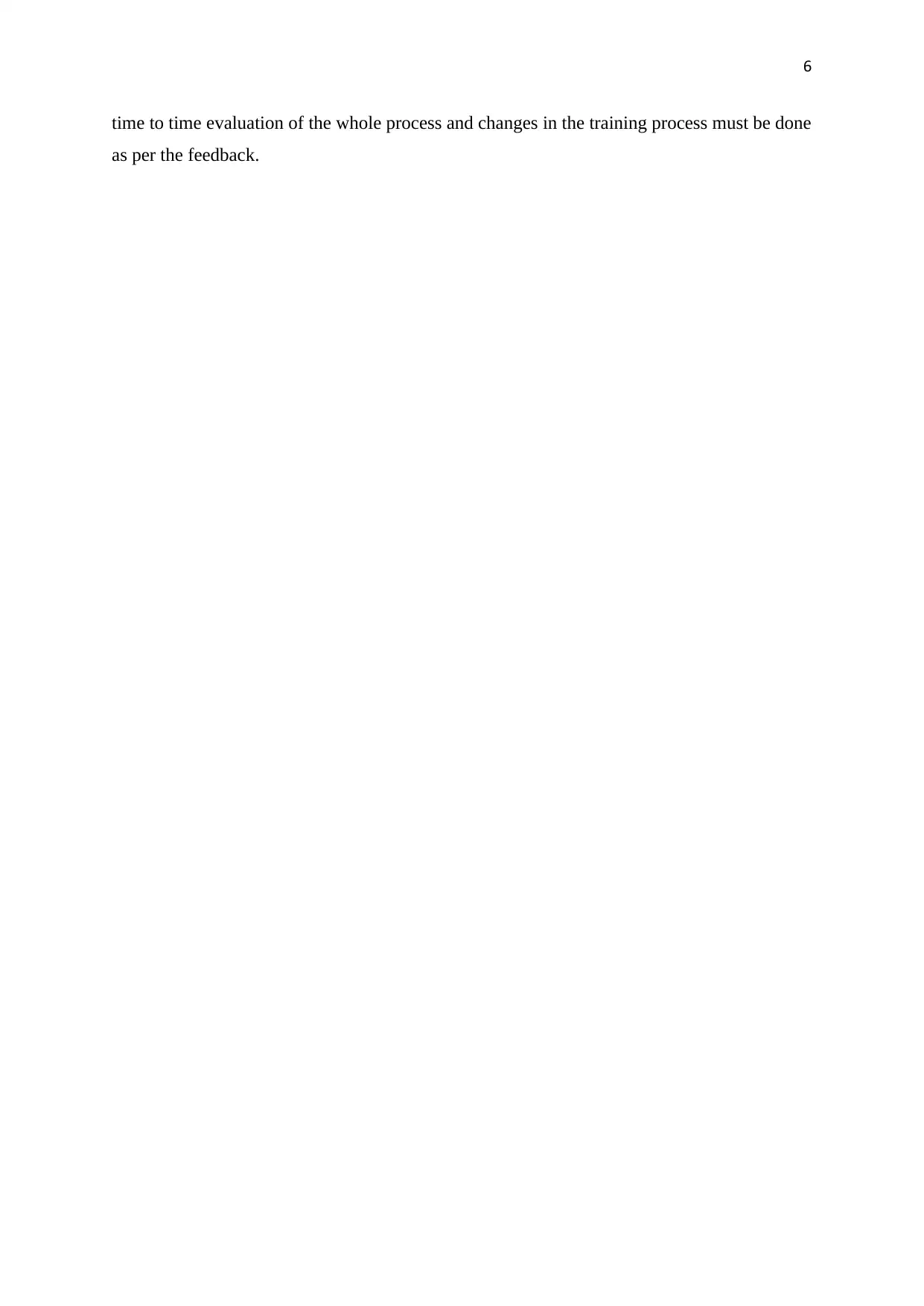
6
time to time evaluation of the whole process and changes in the training process must be done
as per the feedback.
time to time evaluation of the whole process and changes in the training process must be done
as per the feedback.
Paraphrase This Document
Need a fresh take? Get an instant paraphrase of this document with our AI Paraphraser
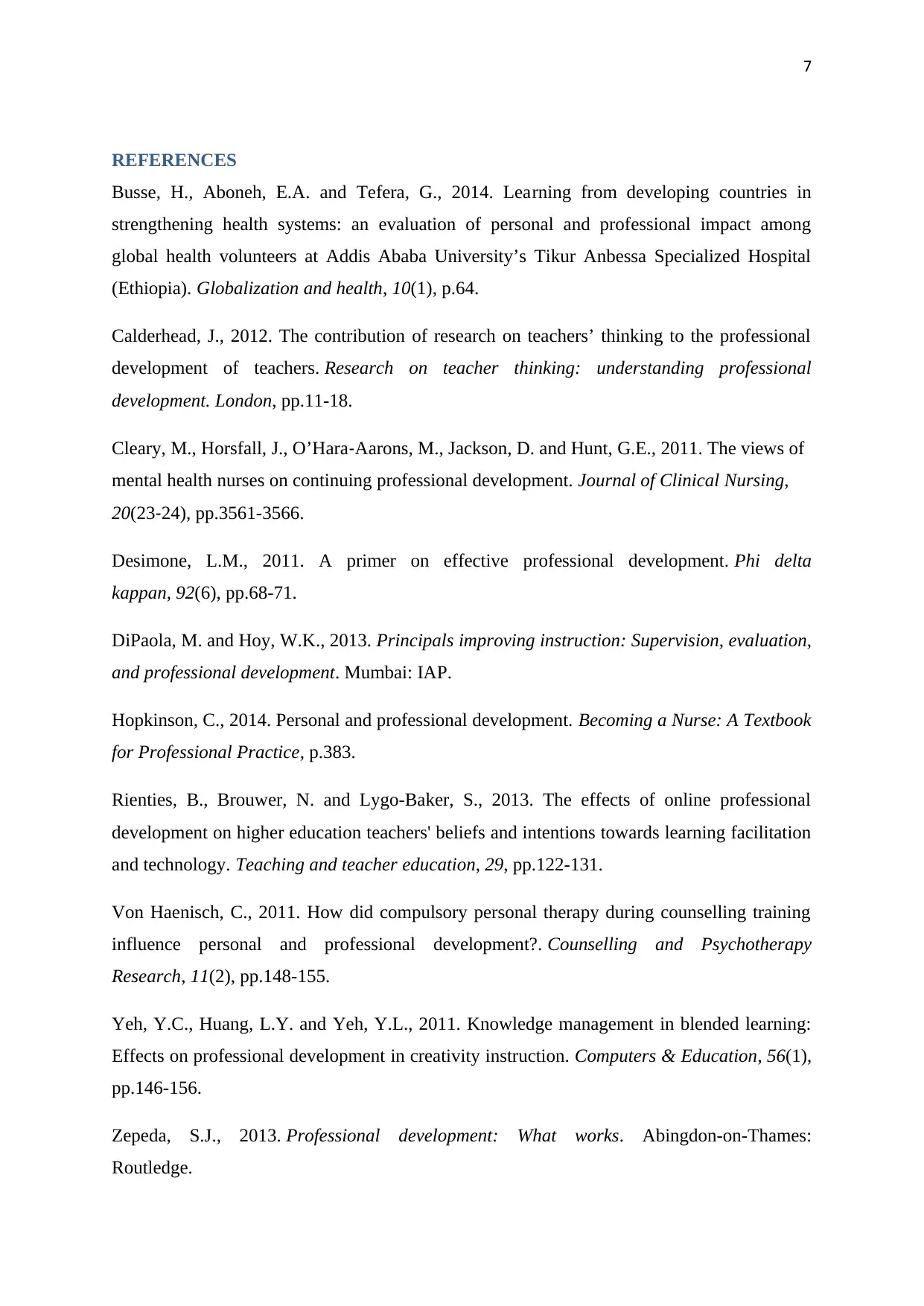
7
REFERENCES
Busse, H., Aboneh, E.A. and Tefera, G., 2014. Learning from developing countries in
strengthening health systems: an evaluation of personal and professional impact among
global health volunteers at Addis Ababa University’s Tikur Anbessa Specialized Hospital
(Ethiopia). Globalization and health, 10(1), p.64.
Calderhead, J., 2012. The contribution of research on teachers’ thinking to the professional
development of teachers. Research on teacher thinking: understanding professional
development. London, pp.11-18.
Cleary, M., Horsfall, J., O’Hara‐Aarons, M., Jackson, D. and Hunt, G.E., 2011. The views of
mental health nurses on continuing professional development. Journal of Clinical Nursing,
20(23‐24), pp.3561-3566.
Desimone, L.M., 2011. A primer on effective professional development. Phi delta
kappan, 92(6), pp.68-71.
DiPaola, M. and Hoy, W.K., 2013. Principals improving instruction: Supervision, evaluation,
and professional development. Mumbai: IAP.
Hopkinson, C., 2014. Personal and professional development. Becoming a Nurse: A Textbook
for Professional Practice, p.383.
Rienties, B., Brouwer, N. and Lygo-Baker, S., 2013. The effects of online professional
development on higher education teachers' beliefs and intentions towards learning facilitation
and technology. Teaching and teacher education, 29, pp.122-131.
Von Haenisch, C., 2011. How did compulsory personal therapy during counselling training
influence personal and professional development?. Counselling and Psychotherapy
Research, 11(2), pp.148-155.
Yeh, Y.C., Huang, L.Y. and Yeh, Y.L., 2011. Knowledge management in blended learning:
Effects on professional development in creativity instruction. Computers & Education, 56(1),
pp.146-156.
Zepeda, S.J., 2013. Professional development: What works. Abingdon-on-Thames:
Routledge.
REFERENCES
Busse, H., Aboneh, E.A. and Tefera, G., 2014. Learning from developing countries in
strengthening health systems: an evaluation of personal and professional impact among
global health volunteers at Addis Ababa University’s Tikur Anbessa Specialized Hospital
(Ethiopia). Globalization and health, 10(1), p.64.
Calderhead, J., 2012. The contribution of research on teachers’ thinking to the professional
development of teachers. Research on teacher thinking: understanding professional
development. London, pp.11-18.
Cleary, M., Horsfall, J., O’Hara‐Aarons, M., Jackson, D. and Hunt, G.E., 2011. The views of
mental health nurses on continuing professional development. Journal of Clinical Nursing,
20(23‐24), pp.3561-3566.
Desimone, L.M., 2011. A primer on effective professional development. Phi delta
kappan, 92(6), pp.68-71.
DiPaola, M. and Hoy, W.K., 2013. Principals improving instruction: Supervision, evaluation,
and professional development. Mumbai: IAP.
Hopkinson, C., 2014. Personal and professional development. Becoming a Nurse: A Textbook
for Professional Practice, p.383.
Rienties, B., Brouwer, N. and Lygo-Baker, S., 2013. The effects of online professional
development on higher education teachers' beliefs and intentions towards learning facilitation
and technology. Teaching and teacher education, 29, pp.122-131.
Von Haenisch, C., 2011. How did compulsory personal therapy during counselling training
influence personal and professional development?. Counselling and Psychotherapy
Research, 11(2), pp.148-155.
Yeh, Y.C., Huang, L.Y. and Yeh, Y.L., 2011. Knowledge management in blended learning:
Effects on professional development in creativity instruction. Computers & Education, 56(1),
pp.146-156.
Zepeda, S.J., 2013. Professional development: What works. Abingdon-on-Thames:
Routledge.

8
⊘ This is a preview!⊘
Do you want full access?
Subscribe today to unlock all pages.

Trusted by 1+ million students worldwide
1 out of 9
Related Documents
Your All-in-One AI-Powered Toolkit for Academic Success.
+13062052269
info@desklib.com
Available 24*7 on WhatsApp / Email
![[object Object]](/_next/static/media/star-bottom.7253800d.svg)
Unlock your academic potential
Copyright © 2020–2026 A2Z Services. All Rights Reserved. Developed and managed by ZUCOL.





